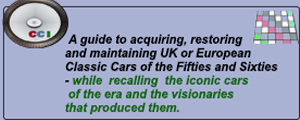
As a young man, HFS studied engineering in London, beginning his career as an apprentice at the world-famous G.W.R. Railway Works in the town of Swindon in the southwest of England.
The steam train at that time remained the premier means of transport in the UK of the early 1900s.
Ever a visionary, HFS began to take an interest in the slowly emerging auto manufacturing industry and soon reaching the conclusion that this is where his future might lie.
In 1905, with the aid of some financial backing from his family, Morgan established a small garage in the rustic village of Malvern in partnership with his work colleague and close friend Leslie Bacon.
 T Morgan and Bacon focused their attention not only in auto service and repairs but also in selling new cars, acting as the local agents for Wolseley, Siddeley and Rover cars of England as well as Automobiles Darracq S.A., a large French car manufacturing concern.
T Morgan and Bacon focused their attention not only in auto service and repairs but also in selling new cars, acting as the local agents for Wolseley, Siddeley and Rover cars of England as well as Automobiles Darracq S.A., a large French car manufacturing concern.
 Although his car sales and service business at Malvern was doing well, HFS Morgan was still very much an innovator at heart.
Although his car sales and service business at Malvern was doing well, HFS Morgan was still very much an innovator at heart.
This curiosity coupled with undoubted engineering talents, meant that he was already planning to take the next step and begin to design and produce his own brand of motor cars.
![]()
Thanks to the extensive dealer network of that Morgan had established throughout the UK, it did not take long for sales of their Runabout progressing encouragingly well. HFS began his plans to increase the company's production facilities, which were stretching at the seams keep up with demand.
 The first stage in the expansion plans was the acquisition of a large parcel of land, close to the present workshops in Malvern.
Construction soon got underway and by 1914, the Morgan Motor Company was fully operational from the two massive production units that they had built on the new site.
More than a century later, that same Malvern site still houses the Morgan factory, with many of the production methods that HFS instituted then still being used today.
The first stage in the expansion plans was the acquisition of a large parcel of land, close to the present workshops in Malvern.
Construction soon got underway and by 1914, the Morgan Motor Company was fully operational from the two massive production units that they had built on the new site.
More than a century later, that same Malvern site still houses the Morgan factory, with many of the production methods that HFS instituted then still being used today.
 The period between the two World Wars marked one of significant expansion for the Morgan Motor Company, with sales of their three-wheelers, especially during the Nineteen Twenties, continued at encouraging levels.
After the war, a large number of former employees who had survived unscathed returned to the Morgan Plant. One of them was Peter Morgan, HTS’s son, who took on the job of Development Engineer for the company.
By the late Forties, demand for three-wheelers had trickled more or less to nothing, with most of the remaining production being shipped overseas to bring in valuable foreign currency.
The last Morgan three-wheeler produced leaving the factory in 1953, more than forty years and two World Wars after the car/motorcycle went into production.
The period between the two World Wars marked one of significant expansion for the Morgan Motor Company, with sales of their three-wheelers, especially during the Nineteen Twenties, continued at encouraging levels.
After the war, a large number of former employees who had survived unscathed returned to the Morgan Plant. One of them was Peter Morgan, HTS’s son, who took on the job of Development Engineer for the company.
By the late Forties, demand for three-wheelers had trickled more or less to nothing, with most of the remaining production being shipped overseas to bring in valuable foreign currency.
The last Morgan three-wheeler produced leaving the factory in 1953, more than forty years and two World Wars after the car/motorcycle went into production.
![]()
In the meantime, demand for Morgan four-wheel cars were high, particularly since they continued to enjoy considerable success in long-distance rallies and on the racetrack.
 The advent of America's Federal Safety Regulations in 1968 effectively precluded Peter Morgan's products from his major export market.
The advent of America's Federal Safety Regulations in 1968 effectively precluded Peter Morgan's products from his major export market.
Rather than lose his ranges' traditional character he directed his attentions very successfully to less demanding regions — production of the basic TR-engined Plus 4s continuing unabated at Pickersleigh Road.
Late in 1968, Morgan made an untypical breakthough, fitting a V8 engine into an existing sports car design.
This new model,followed a lead led by AC and Sunbeam, was marketed as the Morgan Plus 8, used the smooth and light aluminium Rover V8 engine fitted in the 3.5-litre and Three-Thousand-Five saloons.
 The Morgan car company, with Peter Morgan now in charge was moving neatly into the Sixties, as stable as ever, when the company suffered a sad loss with the passing of their renowned founder and chairman H.F.S. Morgan, at the age of 79.
The Morgan car company, with Peter Morgan now in charge was moving neatly into the Sixties, as stable as ever, when the company suffered a sad loss with the passing of their renowned founder and chairman H.F.S. Morgan, at the age of 79.
Tradition continues to play a big part in the Morgan company's design thinking, and also in the attitude of its many home and export customers.
The Morgan car company epitomise the authentic sports car spirit, in a robust and spartan way. Their cars were always interesting to own and fun to drive thanks to their unique characteristics- unequalled by their mass-produced contemporaries.






